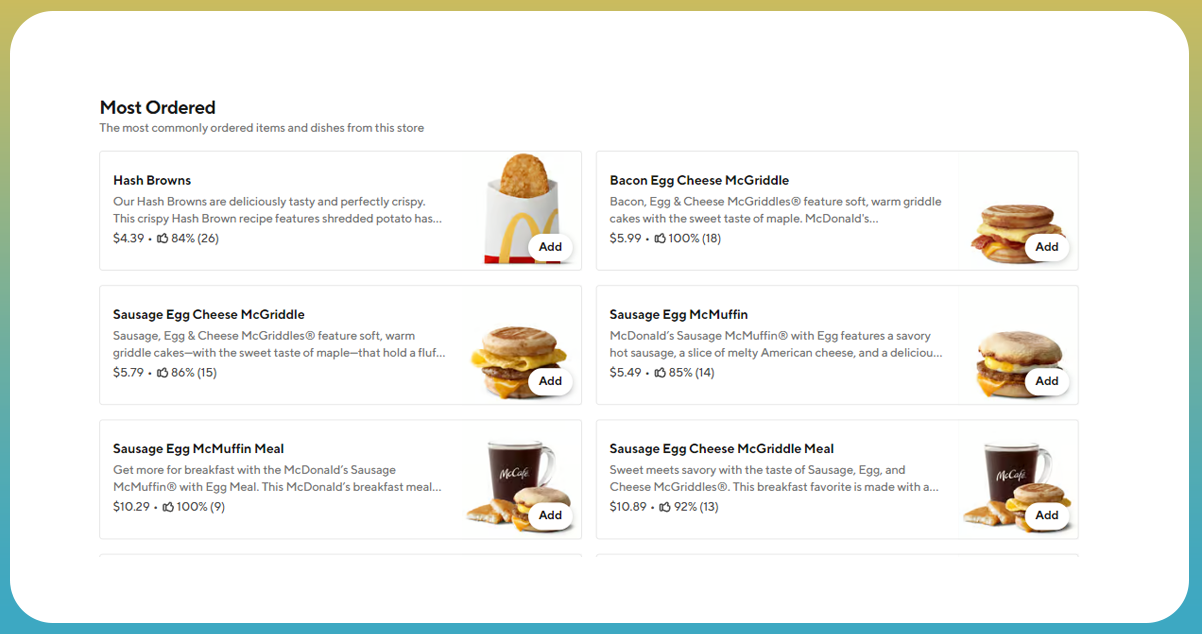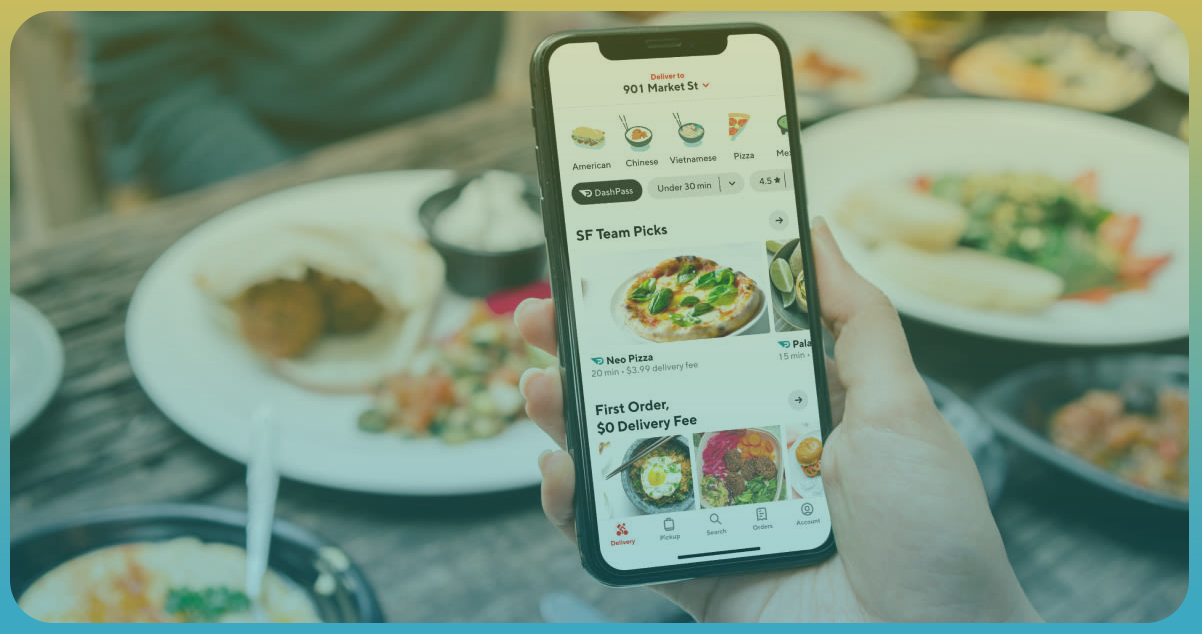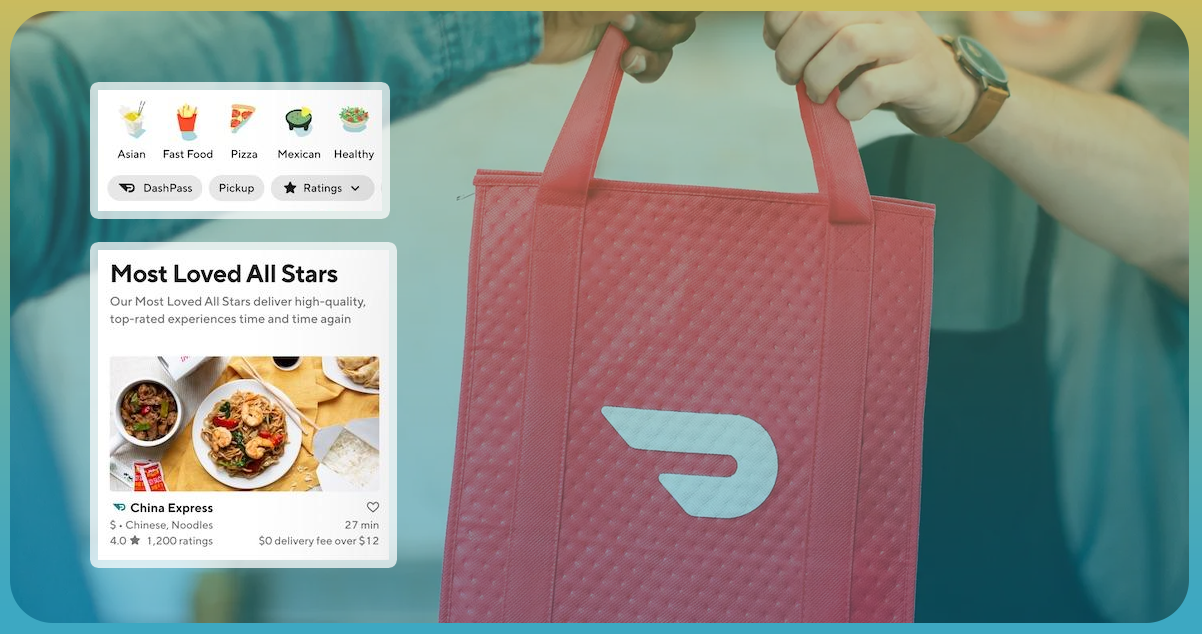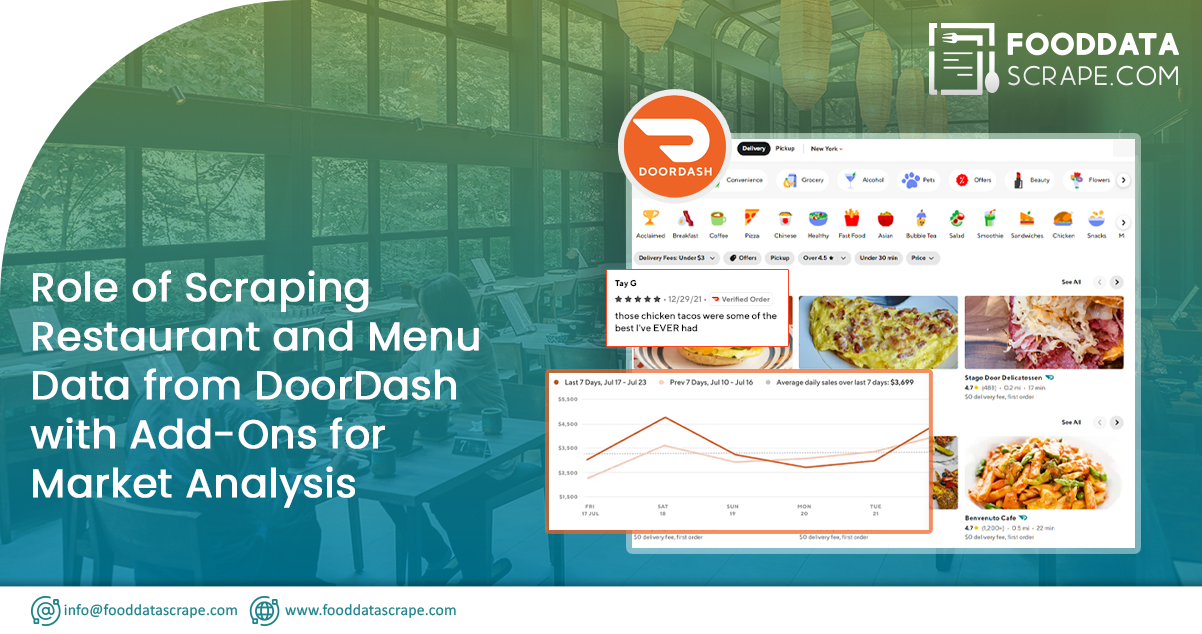In this digital era, competition is increasing when everything is going online. Everyone is trying to stay competitive, and for this, data is playing a crucial role. At the same time, the food delivery business is no such exception. Restaurant owners are continuously looking for data to optimize their business strategies. However, accessing valuable data on restaurants and their menus is essential for food enthusiasts, stakeholders, analysts, marketers, and restauranteurs. DoorDash is a prominent online food ordering and delivery platform with a wealth of valuable information related to restaurants and their menus. By scraping restaurant and menu data from Doordash with add-ons, one can quickly obtain data-driven insights into consumer choices, culinary trends, and competitor strategies.
About Scraping Restaurant and Menu Data

DoorDash data scraping is the systemic collection of structured data, including restaurant details, menus, pricing, addresses, contact info, reviews, ratings, etc. Food delivery data scraping has the potential to help users retrieve massive amounts of data with high speed and accuracy. It helps users collect vast amounts of data faster than manual methods.
A restaurant data scraper helps access DoorDash's web pages and finds and collects relevant information from HTML elements. It focuses on extracting specific data points using specialized techniques like web scraping frameworks, XPath queries, or CSS selectors. At the same time, incorporating add-ons or extensions can speed up the process using data parsing, automatic pagination, and error handling.
DoorDash data scraping services can provide valuable data into the food delivery industry required to stay ahead in the market. It allows businesses to monitor market trends, competitor strategies, and customer choices. Businesses can use the scraped data for informed decision-making processes, strategizing the marketing process, and optimizing menus. Overall, it will significantly enhance business performance and alleviate customer satisfaction. But, during the scraping process, comply with DoorDash's terms of service and legal regulations governing data scraping activities to avoid potential issues or conflicts.
Significance of Scraping Restaurant and Menu Data from DoorDash

Restaurant data scraping comes with innumerable benefits. However, we have listed the most common ones below.
- Analyzing Market Trends: Accessing the scraped data on locations, menus, pricing, reviews, and ratings, market analysts can easily track the prevailing trends, determine market saturation, and identify the most rising opportunities.
- Competitive Intelligence: Analyzing menus, pricing strategies, and customer satisfaction and comparing them to competitors can help businesses understand their competitors' performance and optimize their offerings for greater competitiveness.
- Consumer Understandings: Businesses can use scraped data to understand customer preferences and culinary choices. This allows businesses to optimize their menus, pricing, and marketing strategies to satisfy customer expectations.
- Optimizing Menu: Scraping menu data, including nutritional details, ingredient lists, and pricing data, can help restaurant businesses optimize their menus for dietary choices, regulatory compliance, and profitability.
Steps to Scrape Restaurant and Menu Data from DoorDash with Add-Ons

Scraping restaurant and menu data from Doordash with add-ons involves multiple steps. We are highlighting here for your ease:
Step 1: Choose a Scraping Tool: While you extract DoorDash data, choosing the perfect scraping tool or framework is very important. BeautifulSoup, Scrapy, and Selenium are the most popular options. These tools can easily navigate web pages, collect data, and handle dynamic content.
Step 2: Find Out Data Points: The next step is to find out the specific data points that you want to scrape from DoorDash. These include the name of the restaurant, address, contact details, phone numbers, website URL, menus, pricing, etc.
Step 3: Set Up Scraping Environment: Now, you can install the Doordash scraper and configure the entire scraping environment to handle sessions, cookies, and, if needed, JavaScript rendering. During the scraping process, always comply with the website's terms of service and legal regulations that govern the data scraping activities.
Step 4: Circumnavigate DoorDash Website: You can use the restaurant data extension to circumnavigate the website and find the desired data. This process comprises looking for restaurants based on location, browsing categories, and then accessing the specific pages.
Step 5: Extract Data: Once you are on the desired pages, you can use the tool to scrape restaurant data from HML elements. It includes using multiple techniques like CSS selectors, XPath queries, or regular expressions.
Step 6: Pagination Handling: The DoorDash website may paginate menu listings and search results on multiple pages. By implementing pagination handling techniques, you can scrape data from all pages. However, the add-ons can automate the process by saving time and effort.
Step 7: Parse and Clean Data: When the scraping prices are over, you can parse the data in a structured format, including CSV or JSON. Next, clean the data by eliminating inconsistencies, like duplicates or irrelevant data.
Step 8: Data Storage: Finally, you can store the scraped data in safe and accessible locations like a database or cloud storage. Maintain the integrity of the data and stay compliant with the data protection regulations. Continuous and time-to-time backups and versioning can protect against corruption or data loss.
Conclusion: Thus, this article delved deep into the process of DoorDash restaurant and menu data scraping, enabling researchers and businesses to gain detailed insights into the continuously transforming food industries. By using the power of data scraping with add-ons, businesses can stay competitive, drive strategic decision-making, and satisfy customers with their culinary choices.
Food Data Scrape is at your rescue if you are searching for a reliable data scraping company. The company offers solutions for Food Data Aggregator and Mobile Restaurant App Scraping. We have a proven record of offering accurate data analytics and insights for enhanced decision-making. Contact us for your scraping needs and stay competitive. We will help you to prepare the right strategy with the correct data.






























































































